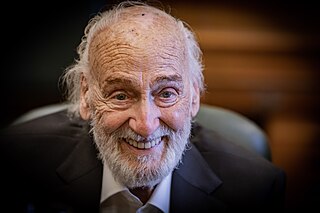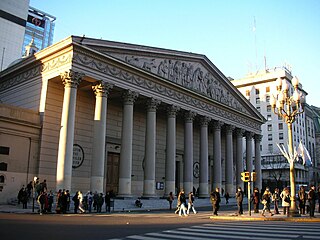
La Plata is the capital city of Buenos Aires province, Argentina. According to the 2022 census, the Partido has a population of 772,618 and its metropolitan area, the Greater La Plata, has 938,287 inhabitants. It is located 9 kilometers inland from the southern shore of the Río de la Plata estuary.

The La Chacarita Cemetery is a cemetery located in the Chacarita neighborhood in Buenos Aires, Argentina. Occupying an area of 95 hectare, it is the largest in the country.

Club Atlético River Plate, commonly known as River Plate, is an Argentine professional sports club based in the Belgrano neighborhood of Buenos Aires. Founded in 1901, the club is named after the English name for the city's estuary, Río de la Plata. River's home stadium, Estadio Monumental, is the largest in South America. River had the highest average home attendance of any association football club in the world in 2023 with 84,567. With more than 350,000 members at the end of 2023, River is one of the largest sports clubs by membership.

Héctor Benjamín Alterio Onorato is an Argentine theatre, film and television actor, well known both in Argentina and Spain.

Gaucho literature, also known as gauchesco ("gauchoesque") genre was a literary movement purporting to use the language of the gauchos, comparable to the American cowboy, and reflecting their mentality. Although earlier works have been identified as gauchoesque, the movement particularly thrived from the 1870s to 1920s in Argentina, Uruguay and southern Brazil after which the movement petered out, although some works continued to be written. Gauchoesque works continue to be read and studied as a significant part of Argentine literary history.

The Metropolitan Archdiocese of Buenos Aires is a Latin Church ecclesiastical territory or archdiocese of the Catholic Church in Argentina. It is a metropolitan archdiocese with 13 suffragan sees in the country, including two Eastern Catholic eparchies.

The Soul of the Accordion is a 1935 Argentine tango musical film from the Golden Age of Argentine cinema directed by Mario Soffici, who wrote it with José A. Bugliot. It is considered one of the earliest classics of Argentine cinema.

Laura Ana "Tita" Merello was an Argentine film actress, tango dancer and singer of the Golden Age of Argentine cinema. In her six decades in Argentine entertainment, at the time of her death, she had filmed over thirty movies, premiered twenty plays, had nine television appearances, completed three radio series and had had countless appearances in print media. She was one of the singers who emerged in the 1920s along with Azucena Maizani, Libertad Lamarque, Ada Falcón, and Rosita Quiroga, who created the female voices of tango. She was primarily remembered for the songs "Se dice de mí" and "La milonga y yo".

Enrique Cahen Salaberry was a prolific Argentine film director whose career in the Cinema of Argentina as a movie director spanned five decades. He is a notable director of the Golden Age of Argentine cinema.

Such Is Life is a 1939 Argentine melodrama film directed by Francisco Múgica and starring Enrique Muiño, Elías Alippi, Enrique Serrano and Sabina Olmos. It is one of the most celebrated films of the Golden Age of Argentine cinema. Based on a successful play of the same title by Nicolás de las Llanderas and Arnaldo Malfatti, it focuses on the history of a bourgeois family from Buenos Aires from the beginning of the 20th century to the present. A Mexican remake Orange Blossom for Your Wedding was released in 1950.

Fernando Siro was an Argentine radio, theatre and film actor, director and screenwriter.

Enrique Serrano (1891–1965) was an Argentine actor and comedian notable for his work during the Golden Age of Argentine cinema.

Jorge Salcedo was a popular Argentine actor of radio, television and feature films, who appeared in film between 1941 and 1980, including the Golden Age of Argentine cinema.

Ricardo Eloy Machado was an Argentine actor. Born in Buenos Aires, he acted in radio, movies, theater and TV. He died in Buenos Aires, Argentina, on April 6, 2010. He was married to actress Noemí Laserre and their daughter is the actress Estela Molly.

Francisco Pérez de Burgos (1558-1617) was a Spanish jurist, military man, merchant and politician, who had a preponderant role during the colonial period of Argentina, where he worked as a public and government notary of the city of Buenos Aires.

Olinda Bozán was an Argentine film actress and comedian of the Golden Age of Argentine cinema. Born into a circus family, she acted on the vaudeville circuit, and performed in silent and sound movies. She was trained by the Podestá brothers, one of whom she married, who have one of the most prestigious Argentine acting awards named for them. Bozán appeared in 75 films and was considered one of the best comic actors of Argentine cinema in the 20th century.

Lumiton is a former film production company and current museum located in Munro, Buenos Aires, Argentina. Lumiton Studios was founded in 1932 at the start of the Golden Age of Argentine cinema. Its lowbrow, populist films appealed to local audiences and were highly successful in Argentina and throughout Latin America. It was the main competitor to Argentina Sono Film in the 1940s.

La rubia del camino is a 1938 Argentine romantic comedy written and directed by Manuel Romero. A celebrated film of the Golden Age of Argentine cinema, it features actress Paulina Singerman in her film debut.

Estudios San Miguel was an Argentine film studio that was active in the 1940s and early 1950s. It flourished during the Golden Age of Argentine cinema, and at its peak was one of the major studios in Buenos Aires. Genres ranged from musical comedy to costume drama and gaucho thriller. Films included La guerra gaucha, co-produced with Artistas Argentinos Asociados, and the comedy Juvenilia (1943), both of which won several major awards. Eva Duarte, soon to become the first lady of Argentina as Eva Perón, appeared in two of the studio's films in 1945. The studio became overextended financially and ceased production after 1952.

Avanza Libertad, originally founded in 2019 as Frente Despertar, was an Argentine right-wing political coalition. Renamed in 2020, Avanza Libertad had legal status in the Buenos Aires Province. Ideologically, it is libertarian conservative, supportive of economic liberalism, and critical of both Kirchnerism and Juntos por el Cambio. Led by José Luis Espert, it included centre-right and far-right factions, with its more radical factions being compared to Spain's Vox.


















